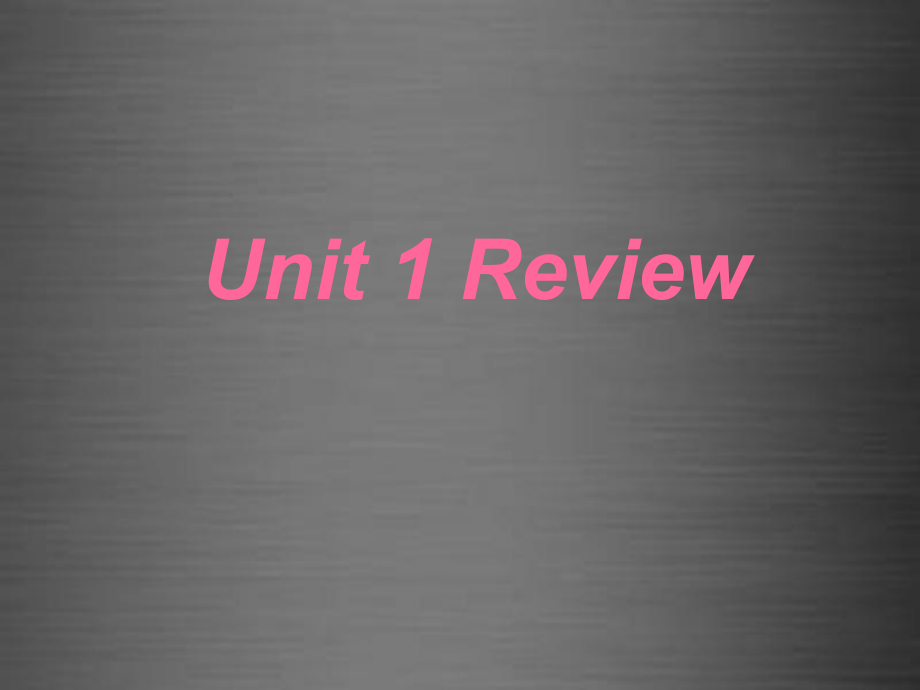《冀教初中英語(yǔ)八上《Unit 1 Me and My Class》PPT課件 (1)》由會(huì)員分享�,可在線(xiàn)閱讀,更多相關(guān)《冀教初中英語(yǔ)八上《Unit 1 Me and My Class》PPT課件 (1)(20頁(yè)珍藏版)》請(qǐng)?jiān)谘b配圖網(wǎng)上搜索����。
1、Unit 1 ReviewLearning Aims知識(shí)目標(biāo):知識(shí)目標(biāo):1.熟練掌握本單元單詞����。熟練掌握本單元單詞�����。能力目標(biāo):能力目標(biāo):1.學(xué)會(huì)一般現(xiàn)在式的結(jié)構(gòu)及其用法���。學(xué)會(huì)一般現(xiàn)在式的結(jié)構(gòu)及其用法��。情感目標(biāo):情感目標(biāo):2.熟練運(yùn)用本單元詞組及句型�����。熟練運(yùn)用本單元詞組及句型��。2.學(xué)會(huì)寫(xiě)電子郵件�。學(xué)會(huì)寫(xiě)電子郵件。通過(guò)本單元學(xué)習(xí)�����,增進(jìn)對(duì)學(xué)習(xí)�����、通過(guò)本單元學(xué)習(xí)�,增進(jìn)對(duì)學(xué)習(xí)、生活的熱愛(ài)��。生活的熱愛(ài)��。I.詞匯詞匯class,grade,student,pupil,classmate,Miss,Ms.,Mrs.,Mr.,married,husband,parent,cousin,dislike,hate,g
2�、lad,silly,nervous,jeans,wool,cotton,blouse,1.掌握詞匯:掌握詞匯:voice,piano,singer,violin,music,comb,name,invite,paint,back,either,really,also,later,interest,special,gray,weekend,diary,photo,have,wish,finish,introduce,write down,get out of the bed,backpack,photograph,England,dinosaur,more,round,tidy,iron2.認(rèn)知
3、詞匯:認(rèn)知詞匯:.Likes and dislikesI like to wear my red coat.Sandra like going for walks.Sandra loves to eat many different foods.I dont like my picture.I dislike Mondays.I hate rain.I hate getting out of the bed.I hate to comb my hair.III.語(yǔ)法語(yǔ)法Simple Present Tense 一般現(xiàn)在時(shí)一般現(xiàn)在時(shí)一般現(xiàn)在時(shí)態(tài)是英語(yǔ)中最基礎(chǔ)的時(shí)態(tài)�����,我們必須牢固掌握����,為今后的英語(yǔ)
4�����、學(xué)習(xí)打下堅(jiān)實(shí)的基礎(chǔ)�。1.表示現(xiàn)在的狀態(tài)或經(jīng)常性的動(dòng)作��。如:表示現(xiàn)在的狀態(tài)或經(jīng)常性的動(dòng)作��。如:一����、一般現(xiàn)在時(shí)態(tài)的基本用法一、一般現(xiàn)在時(shí)態(tài)的基本用法He works from Monday to Friday every week.他每周從周一到周五上班�����。他每周從周一到周五上班��。2.表示現(xiàn)在的能力�����、特征�����、職業(yè)等����。如:表示現(xiàn)在的能力、特征�����、職業(yè)等�。如:Li Ming speaks English well.李明英語(yǔ)說(shuō)得很好。李明英語(yǔ)說(shuō)得很好���。The sun rises in the east.太陽(yáng)從東方升起��。太陽(yáng)從東方升起����。3.表示普遍存在的真理或客觀(guān)事實(shí)����。如:表示普遍存在的真理或客觀(guān)事實(shí)。如:(1
5���、)系動(dòng)詞)系動(dòng)詞be(am,is,are)的一般現(xiàn)在時(shí)態(tài)��。)的一般現(xiàn)在時(shí)態(tài)�����。如:如:二��、一般現(xiàn)在時(shí)態(tài)的分類(lèi)二��、一般現(xiàn)在時(shí)態(tài)的分類(lèi)1.分類(lèi)分類(lèi)Zhang Qiang likes travelling around the world.張強(qiáng)喜歡環(huán)游世界�。張強(qiáng)喜歡環(huán)游世界。He is a kind and honest man.他是一個(gè)善良�����、誠(chéng)實(shí)的人��。他是一個(gè)善良�����、誠(chéng)實(shí)的人���。(2)行為動(dòng)詞的一般現(xiàn)在時(shí)態(tài)。如:)行為動(dòng)詞的一般現(xiàn)在時(shí)態(tài)�。如:2.肯定句肯定句系動(dòng)詞系動(dòng)詞be的一般現(xiàn)在時(shí):的一般現(xiàn)在時(shí):“主語(yǔ)主語(yǔ) be 其他其他”����。主語(yǔ)為第一人稱(chēng)單數(shù)用主語(yǔ)為第一人稱(chēng)單數(shù)用am��,第三人稱(chēng)單數(shù)用�����,第三人稱(chēng)單數(shù)
6���、用is�,其余一律用其余一律用are����。如:。如:I am from China.我來(lái)自中國(guó)��。我來(lái)自中國(guó)����。She is a Canadian girl.她是一個(gè)加拿大女孩。她是一個(gè)加拿大女孩����。They are beautiful in blue clothes.他們穿著藍(lán)色的衣服非常好看����。他們穿著藍(lán)色的衣服非常好看���。3.否定句否定句(1)系動(dòng)詞)系動(dòng)詞be的一般現(xiàn)在時(shí)的否定句:的一般現(xiàn)在時(shí)的否定句:“主語(yǔ)主語(yǔ) be not 其他其他”��。如:如:He is not in China now.他現(xiàn)在不在中國(guó)�。他現(xiàn)在不在中國(guó)����。(2)行為動(dòng)詞的一般現(xiàn)在時(shí)的否定句:)行為動(dòng)詞的一般現(xiàn)在時(shí)的否定句:“主語(yǔ)主語(yǔ)
7、 do/does not 動(dòng)詞原形動(dòng)詞原形 其他其他”��。如:如:They dont go to school on weekends.他們周末不上學(xué)����。他們周末不上學(xué)。She doesnt watch TV at home.她在家不看電視���。她在家不看電視�。4.特殊疑問(wèn)句特殊疑問(wèn)句“特殊疑問(wèn)詞特殊疑問(wèn)詞 一般疑問(wèn)句一般疑問(wèn)句”����。如:。如:Where is he from?他來(lái)自哪里�����?他來(lái)自哪里��?When do you get up every day?你每天幾點(diǎn)起床�?你每天幾點(diǎn)起床?Where do you want to go?你想去哪里����?你想去哪里?ExercisesI.選出與句中劃線(xiàn)部分意思
8�、相同或相近的選項(xiàng)。選出與句中劃線(xiàn)部分意思相同或相近的選項(xiàng)����。1.My brother and I stay at home at the weekend.We dont go to school.A.in B.on C.of D.to2.Mr.White has lived in Shanghai for two months.A.come B.be C.was D.has been3.I have four more apples.A.other four B.four anotherC.another four D.the four other4.Danny,what are you thi
9、nking about?A.thinking of B.thinking onC.thinking for D.thinking out of5.Her sweater is just like mine.A.to look B.look like C.the same as D.likes1.My brother isnt here now.He _(go)to Beijing.2.My coat is made of cotton.What about_(you)?3.Jenny _(not like)playing basketball.4.How many _(subject)do y
10�、ou have at school this term?5.Our class is like a big family:_(friend)and happy!II.用所給單詞的適當(dāng)形式填空。用所給單詞的適當(dāng)形式填空���。friendlyhas goneyoursdoesnt likesubjects1.He wanted me _ him with English after lunch.A.help B.helps C.helped D.to help2.He _ his homework and now he is watching TV.A.had finished B.finishes
11���、C.has finished D.finishIII.單項(xiàng)選擇�。單項(xiàng)選擇���。DC3.Alice White is Toms sister.She isnt married,so we should call her _.A.Mrs.White B.Miss Alice C.Ms.Alice D.Miss White 4.When I _ the farm,the children had finished _ the apples.A.reached;picking B.got;picking C.came;picked D.arrived in;to pick5.Do you find _ v
12�、ery interesting to play with a Yo-Yo?A.this B.it C.those D.itsDAB1.We often play basketball _ school to relax.2.Li Ming and Danny are _ the same football team.3.Its late.Good-bye _ now!4.We have a class meeting _ Monday.5.Tell your friend something _ your first two weeks of school.IV.用適當(dāng)?shù)慕樵~填空�����。用適當(dāng)?shù)慕樵~填空�。aboutafteron/inforon 復(fù)習(xí)第一單元學(xué)過(guò)的內(nèi)容。復(fù)習(xí)第一單元學(xué)過(guò)的內(nèi)容�����。Homework
 冀教初中英語(yǔ)八上《Unit 1 Me and My Class》PPT課件 (1)
冀教初中英語(yǔ)八上《Unit 1 Me and My Class》PPT課件 (1)

